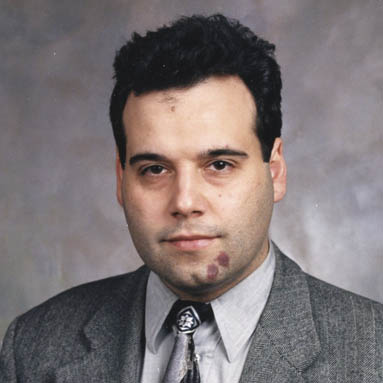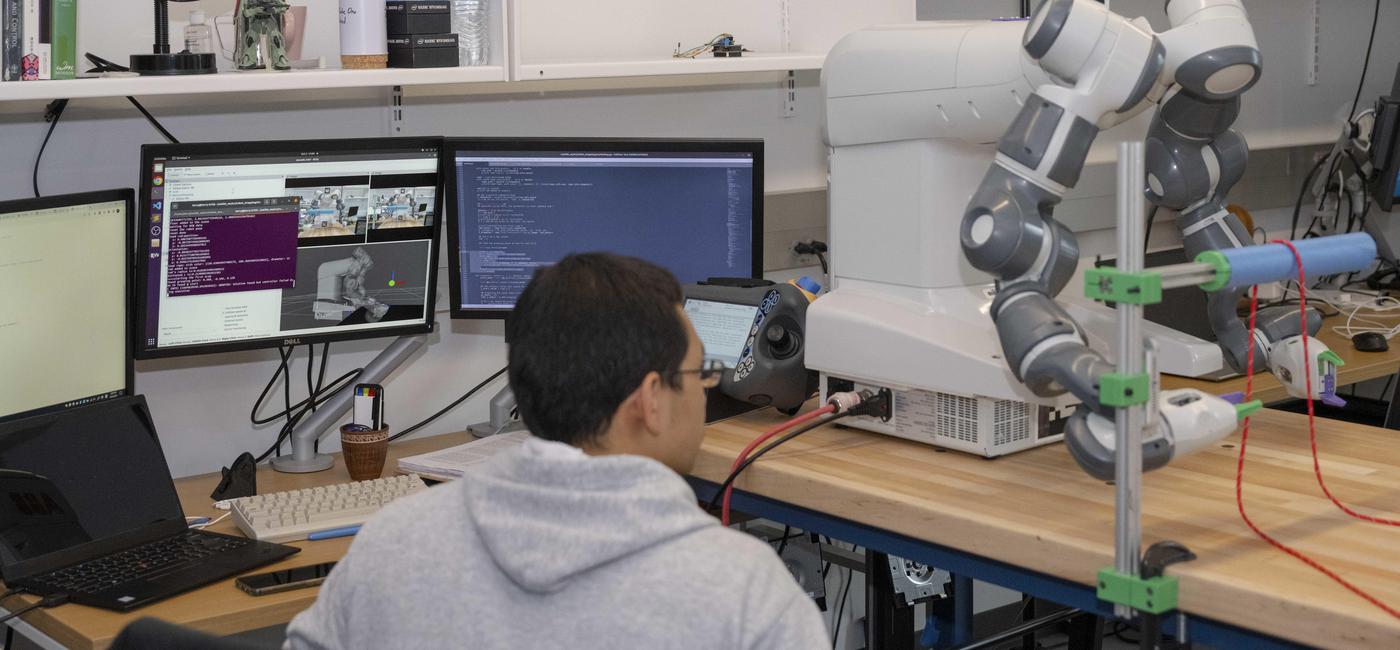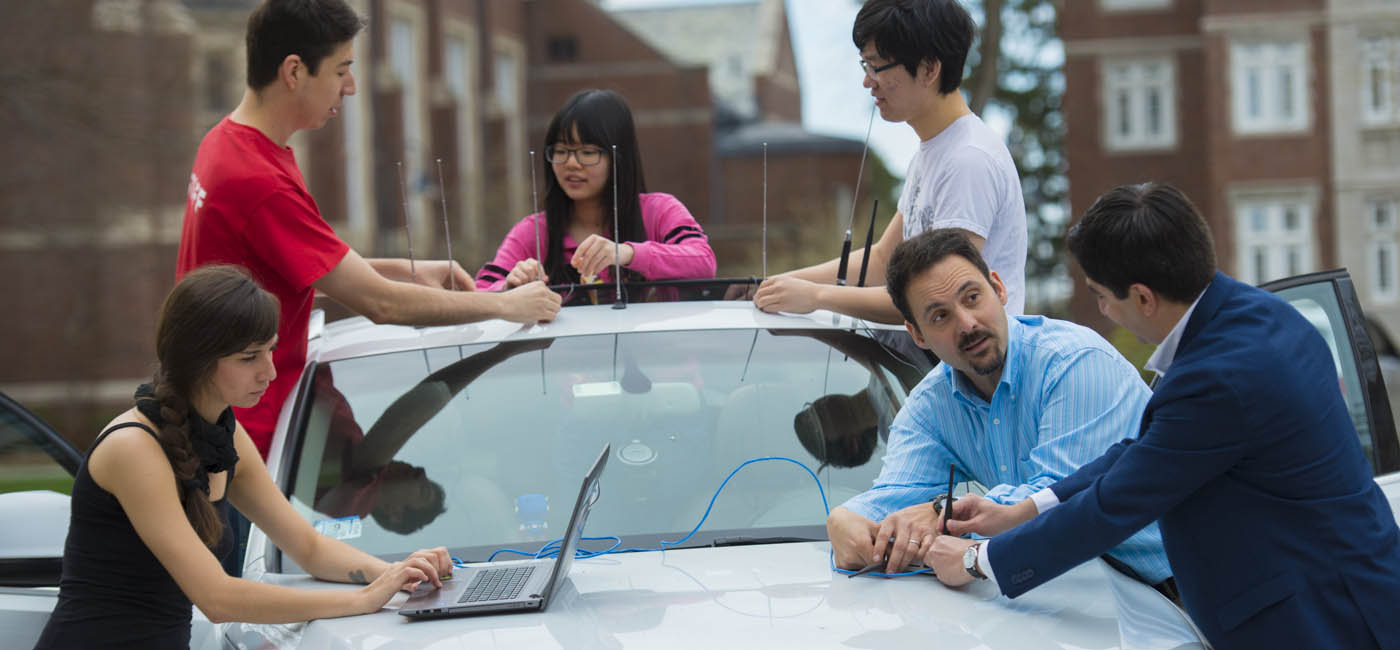The Next Era of Computer Engineering Is Here. Are You Ready?
Prepare to design, build, and deploy hardware and software solutions for intelligent systems that make up our connected world—with WPI’s Master of Science in Electrical and Computer Engineering.
This is an especially exciting time to be an electrical or computer engineer. With companies like Apple leading the way with their systems on a chip (SoCs), along with the U.S. CHIPS and Science Act, the tech landscape has ushered in a new era of innovation and competition. Industry challenges, including supply chain ones, have created a need for new and creative solutions to meet market demands.
Available on campus or online, you’ll have the flexibility to earn your degree full-time or part-time around your professional obligations. And no matter how you study, you’ll have full access to our world-renowned faculty and facilities.
Ready to stand out in this competitive, highly technical field? The MS in Electrical and Computer Engineering at WPI will get you there faster.
This program is also available online
Learn moreGraduates of WPI’s MS in Electrical and Computer Engineering are well positioned for dynamic roles in industries like healthcare, cybersecurity, robotics, and energy.
$138,080
Median salary for computer hardware engineers
U.S. Bureau of Labor Statistics, 2023
42,000
New semiconductor jobs from the CHIPS and Science Act by 2027
Semiconductor Industry Association
Program Highlights
- Learn real industry lessons from faculty who have lived it. Electrical and computer engineering (ECE) faculty at WPI are renowned leaders in the hardware and software industries. Their firsthand experience in the field makes them invaluable as educators and mentors.
- Apply ECE to your pick of fast-growing fields. Become a well-rounded expert and leader by tailoring your studies with courses that bridge electrical and computer engineering with cybersecurity, healthcare, robotics, sustainability, and more.
- Use technology on the cutting edge of industry trends. WPI’s semiconductor failure analysis system is one of only three systems of its kind in higher education. This and other state-of-the-art tools and equipment will help you prepare to lead future innovation.
- Build a specialized, in-demand skill set. Dive deeper and gain hands-on experience in a highly technical niche such as semiconductors, radio frequency, electromagnetics, or digital signal processing.

best online master's in engineering programs
best colleges for engineering in America
Innovative Research in Electrical and Computer Engineering
Our approach to the MS in Electrical and Computer Engineering is all about hands-on research. WPI’s world-class faculty are known for fueling breakthroughs that impact the world, and you’ll work alongside them in our labs using devices, instruments, and cutting-edge technologies.
Research Focus Areas
- Healthcare/Quality of Life: biomedical signal processing/modeling/instrumentation, wearable sensors, MRI/medical/electromagnetic imaging methods, body area networking, on-body antenna prototyping
- Security and Privacy: secure control of cyberphysical systems, cryptographic algorithm implementation, network security, embedded security, physical security, side-channel cryptanalysis
- Smart and Connected World
- CyberPhysical Systems: embedded systems, real-time digital signal processing, high-performance computing, logic synthesis, RF/microwave circuits, mixed-signal/VLSI circuits, applied and numerical electromagnetics, cognitive and software-defined radio, wireless communications and networking, localization, estimation, and detection
- Robotics: robotic controls, automata theory, optimization, localization for cooperative robotics, machine vision/recognition
- Energy & Sustainability: solar/wind/renewable energy, power electronics, high-voltage technology, energy conversion, smart cities, sustainability engineering, power systems and quality
Semiconductors, security, and more
Through a nearly $2 million grant from The Innovation Institute at MassTech, WPI is home to a research center focused on the security of semiconductors and hardware—and it features one of only three semiconductor failure analysis systems of its kind in a U.S. higher education institution.
Curriculum for the Master's in Electrical and Computer Engineering
Students in the master’s in ECE program complete most of their courses and research in electrical and computer engineering, but they can also select from master’s courses for ECE students in allied areas such as computer science, robotics, systems engineering, mathematics, and physics. WPI’s flexible electrical and computer engineering master’s degree allows you to tailor the studies to your interests.
As you fulfill your master’s in electrical and computer engineering, you’ll complete either a non-thesis option (which permits directed research and/or independent study) or a thesis option. The thesis option is strongly recommended if you plan to enter a PhD program. Students and faculty work closely together to develop a plan of study that matches both your interests and your professional goals. After graduation, your knowledge will position you to earn a top electrical and engineering salary rate.
Frequently Asked Questions
What Does an Electrical and Computer Engineer Do?
- Use the power of digital and analog electronics to solve pressing problems in the environment, to improve quality of life, to build a better future and a better world.
- Work with experts to understand the deep challenges in domains such as healthcare, communications, finance and transportation, and create novel solutions with the tools of electronics and software.
- Use state-of-the-art simulation and prototyping techniques to understand the opportunities, the limitations and the robustness of hardware and software before they are brought to market.
- Educate and train peers in novel insights and solutions for complex electronic engineering problems.
What Kind of Work Does an Electrical and Computer Engineer Do?
- Groundbreaking integrated sensors for around-the-clock medical monitoring and specialized care
- Hack-proof embedded computers that add a root-of-trust to the world of connected devices, from electronic wallets to autonomous cars to the cloud.
- Integrated Intelligent Systems that solve hard problems in real time using state-of-the-art Machine Learning and AI.
- Next-generation wireless communications that move more digital data faster and more efficiently through the latest communication standards.
What Are Some Benefits to Pursuing an MS in Electrical and Computer Engineering?
- Learn foundational knowledge in emerging fields in hardware and software.
- Experience the state-of-the-art in research, and carrying valuable know-how to your future employer.
- Prepare yourself for an academic career in research and education.
Similar Majors
Faculty Profiles




Ready to Fulfill Your Master’s in Electrical and Computer Engineering?
As an ECE master’s student, you’ll dive into fundamentals of computers and electrical engineering courses that will challenge you to think innovatively and technically as you solve complex problems. Our expert faculty will introduce you to master’s courses for ECE students that involve hands-on technologies as you fulfill research projects. Graduates of this program find their return on investment in the job market is excellent as an electrical and computer engineering salary is strong.
Need to Earn Your Bachelor Of Science In Electrical And Computer Engineering Before You Consider Master’s Courses for ECE Students?
Our BS program immerses students in hands-on, cutting-edge projects that make real-world impact from medical devices to cell phones. Or consider covering electrical and computer engineering basics with our minor in ECE and have the opportunity to explore diverse topics that interest you most—from electronic circuits to electromagnetic fields and circuit design.
Need to Earn a Bachelor’s in Computer Science First?
Are you ready to start your path to a computer science career? Check out WPI’s BS in computer science which explores the connected world and global perspectives. If you’re looking for background in the computer science field that will complement your major, consider WPI’s minor in computer science.
Explore Electrical & Computer Engineering Graduate Certificates
Looking to gain the training and expertise to advance your career in electrical and computer engineering? Check out our graduate certificates in electrical and computer engineering which help increase your expertise in the field.
Do You Prefer to Learn Online?
Our online graduate certificate in ECE challenges students in modeling, design, verification, and testing of hardware systems.
Earn Your ECE Master’s Online
Prefer to earn your master’s in electrical and computer engineering online rather than on-campus? Our ECE master’s online program provides students the flexibility to learn on their own time while still being challenged with the same rigorous computer and electrical engineering education.
Get On the Fast Track Toward a PhD in Electrical and Computer Engineering
Are you driven to elevate your ECE career even further? Our PhD in electrical and computer engineering inspires grads to solve critical issues like developing data security and more reliable wireless networks.
Explore WPI’s Master of Engineering in ECE
Prefer to earn a master of engineering in ECE rather than a master of science? Check out our MEng master’s which gives students the ability to focus on business-related courses.
Graduate Studies Series
Team members from Graduate & Professional Studies host quick and convenient webinars designed to highlight popular topics when starting grad school. Take a deep dive into specific areas of interest such as how to secure funding, how to ace your application, an overview of student services, and more!
Refer a Friend
Do you have a friend, colleague, or family member who might be interested in a WPI graduate program? Click below to tell them about our programs.
Have questions?
WPI's dedicated graduate student support team can help.


